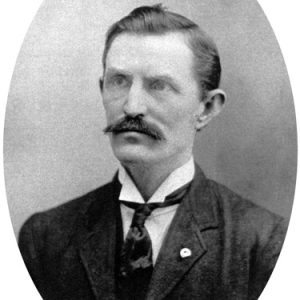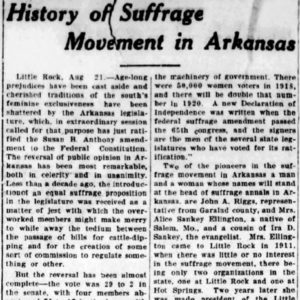calsfoundation@cals.org
John Andrew Riggs (1867–1936)
John Andrew Riggs was a pioneer, politician, early aviator, patent medicine business proprietor, and father of women’s suffrage in Arkansas. Riggs’s Act 186 of 1917 allowed women to vote in the Democratic primary in Arkansas. This enfranchisement of women paved the way for Arkansas’s ratification of the Nineteenth Amendment to the U.S. Constitution.
John Riggs was born on November 5, 1867, in Shelby County, Illinois, the eldest of six children of Elbridge Marion Riggs and Sarah Ann Hubbartt. His parents were farmers and merchants. In 1877, the extended Riggs family moved to Sumner County, Kansas, the Southern border of which was Indian Territory.
In 1889, Riggs was one of over 50,000 pioneers in a line stretching for 100 miles along the southern Kansas border, waiting for the pistol shot that allowed them to vie for two million acres of claimable land. Riggs homesteaded 160 acres for fourteen dollars. He settled his land and, on June 29, 1890, he returned to Sumner County to marry Ida Louisa Callahan. They settled in Sheridan, Oklahoma.
For eleven years, Riggs raised cattle, farmed, traded, and served as a constable and coroner. His trading post was named Fence Post Johnnies’ for the lightning-proof fence post he invented to protect cattle from death due to lightning strikes. Riggs is recognized at the Oklahoma State Museum among 300 early Oklahoma pioneers whose names are embossed on a stretched buffalo skin.
In 1901, his wife and four children returned to Kansas. He sold everything and joined them in Wichita. Here, he developed the “Lopez Medicine Remedy” patent medicine. In 1905, he moved his family to Arkansas, launching Lopez Medical Remedy on Broad Street in downtown Hot Springs (Garland County). The medicine sold well nationwide until Riggs’s death in 1936.
In 1908, Riggs financed the Hot Springs Airship Company with local aviator Joel Rice as his partner. They incorporated and sold shares. In 1909, they took their American Eagle dirigible to New York City to the Hudson-Fulton Celebration week, participating in America’s first aeronautical show. One feature was their “Seeing-New-York-From-Above” vehicle that departed Madison Square Garden with fourteen passengers at a time and traveled over the city. “Hot Springs, Arkansas” was emblazoned on both sides. Meanwhile, the company built the largest steel-framed dirigible in America at Morris Park, New York, at a cost of over $5,000. After one trial run, a gale destroyed the facility, the ship, and the partnership with Rice. Riggs refused to finance a third dirigible unless he was given exclusive rights. A long, bitter lawsuit ensued between the parties in 1910 over the ownership of the company, which effectively ended the venture.
In July 1911, Riggs purchased the newspaper that would become the Hot Springs New Era, forming the Southern Newspapers company. He served as owner and publisher until he sold it to the Palmer chain in 1929.
Riggs was elected as a Democrat to the Arkansas House of Representatives, serving 1917–1919 and 1923–1925. Among his successful bills were those that mandated paving the Hot Springs to Little Rock (Pulaski County) highway, established the city-manager form of government for Hot Springs, and passed a gross income state sales tax. He was also the author of the Primary Suffrage Bill, HB 340, which enfranchised women to vote in primary elections. HB 340 was a significant victory, making Arkansas the first non-suffrage state that allowed women to vote in Democratic primary elections. Introduced on February 7, 1917, the bill passed the House by a vote of 54–27, and on February 27, the Senate’s 17–15 “yea” vote gave full passage. Riggs was a Democratic candidate for governor in 1920 but was defeated in the primary by Thomas Chipman McRae.
Riggs died of cancer on March 4, 1936, and is buried in Hot Springs.
For additional information:
“Air Age Comes to Spa Early; Airship Built Here in ‘08.” The Sentinel Record. April 27, 1958. p. 20.
Allsopp, Frederick W. History of the Arkansas Press for a Hundred Years and More. Little Rock: Parke-Harper Publishing Co., 1922.
Obituary of John Andrew Riggs. “John A. Riggs Succumbs to Illness.” Hot Springs Sentinel-Record. March 6, 1936, p. 1.
Wade, Stephanie Haught. “John Andrew Riggs and Arkansas’s Primary Suffrage Bill.” Arkansas Historical Quarterly 79 (Autumn 2020): 254–277.
Elizabeth Riggs Brandon
Little Rock, Arkansas
 Business, Commerce, and Industry
Business, Commerce, and Industry Mass Media
Mass Media Politics and Government
Politics and Government Roads and Highways
Roads and Highways John Riggs
John Riggs  Suffrage Article
Suffrage Article 




Comments
No comments on this entry yet.